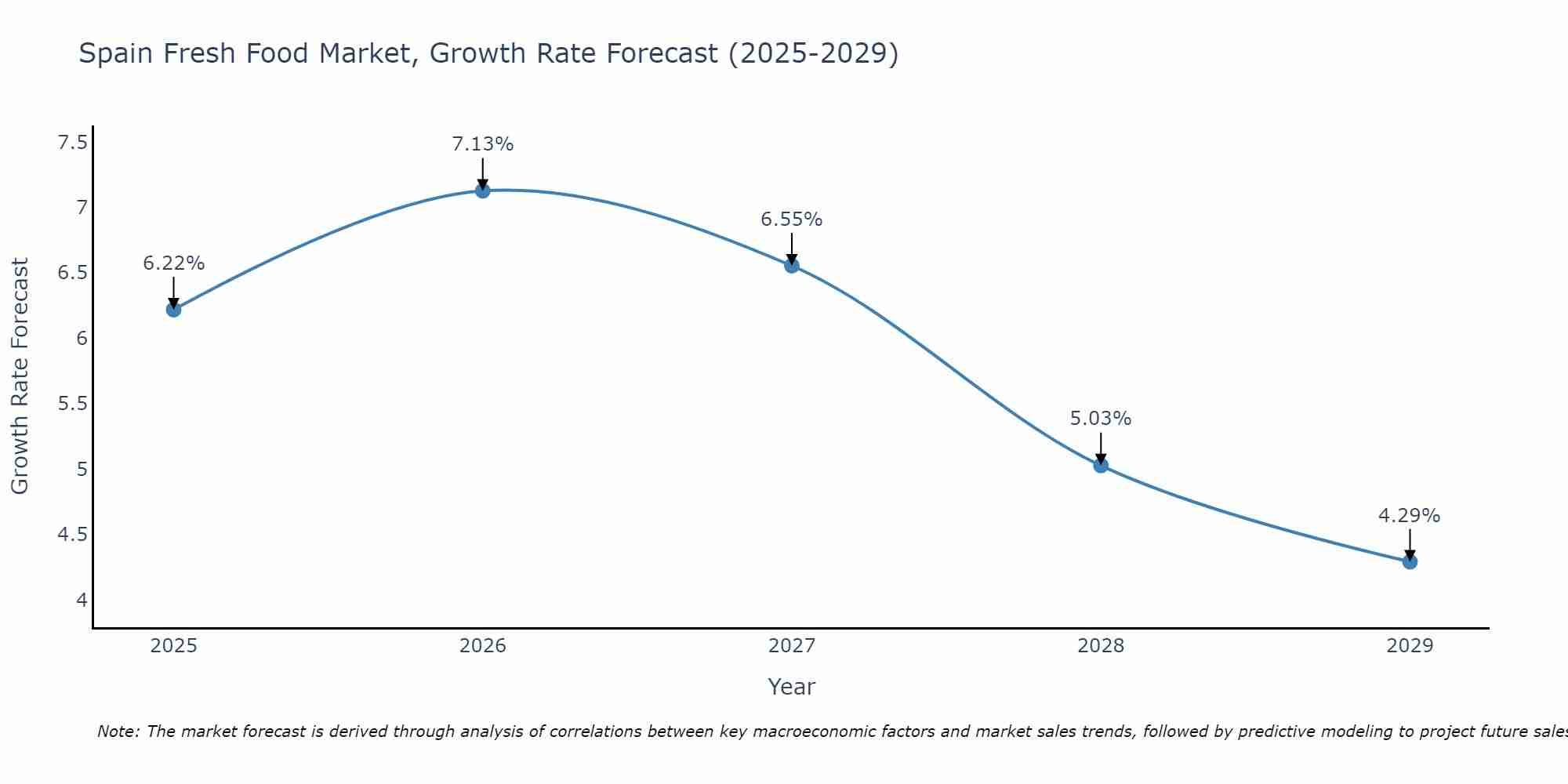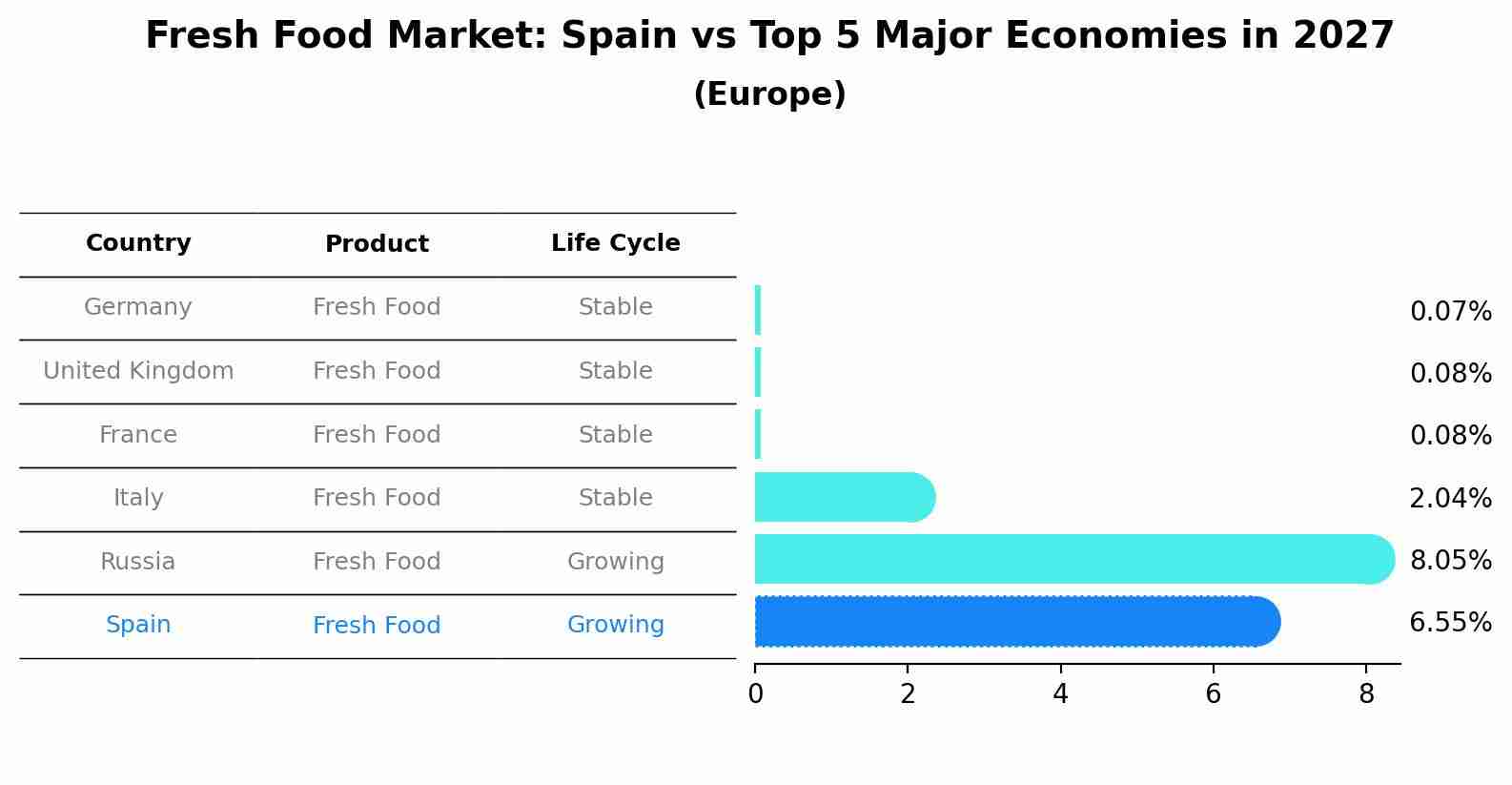Spain Fresh Food Market (2025-2031) Outlook | Growth, Size, Industry, Trends, Revenue, Companies, Forecast, Analysis, Value & Share
| Product Code: ETC382094 | Publication Date: Aug 2022 | Updated Date: Jul 2025 | Product Type: Market Research Report | |
| Publisher: 6Wresearch | Author: Summon Dutta | No. of Pages: 75 | No. of Figures: 35 | No. of Tables: 20 |
Spain Fresh Food Market Size Growth Rate
The Spain Fresh Food Market is projected to witness mixed growth rate patterns during 2025 to 2029. Starting at 6.22% in 2025, the market peaks at 7.13% in 2026, and settles at 4.29% by 2029.

Fresh Food Market: Spain vs Top 5 Major Economies in 2027 (Europe)
The Fresh Food market in Spain is projected to grow at a growing growth rate of 6.55% by 2027, highlighting the country's increasing focus on advanced technologies within the Europe region, where Germany holds the dominant position, followed closely by United Kingdom, France, Italy and Russia, shaping overall regional demand.

Spain Fresh Food Market Synopsis
The Spain Fresh Food Market is a dynamic and diverse sector characterized by a wide variety of products including fruits, vegetables, meats, seafood, and dairy products. The market is driven by consumer preferences for fresh, locally sourced, and high-quality food products. Spaniards have a strong culinary tradition and a preference for fresh ingredients in their traditional dishes, leading to a high demand for fresh food items. Retailers, supermarkets, farmer`s markets, and specialty stores play a key role in distributing fresh food products to consumers across the country. The market is also influenced by factors such as changing consumer lifestyles, health consciousness, and sustainability trends, leading to an increasing demand for organic and sustainable fresh food options. Overall, the Spain Fresh Food Market presents opportunities for both domestic producers and international suppliers to cater to the growing consumer demand for fresh and high-quality food products.
Spain Fresh Food Market Trends
In the Spain Fresh Food Market, there is a noticeable shift towards organic and locally sourced products, driven by increasing consumer awareness of health and sustainability. Consumers are becoming more conscious of the food they eat, leading to a growing demand for fresh fruits and vegetables, meat, and dairy products that are free from pesticides and other harmful chemicals. Additionally, there is a rising interest in specialty and exotic fresh foods, as consumers seek unique and diverse culinary experiences. Convenience is also a key trend, with a preference for pre-cut and pre-packaged fresh food items to save time in meal preparation. Lastly, online shopping for fresh food is gaining popularity, with more consumers opting for home delivery or click-and-collect services for their grocery needs.
Spain Fresh Food Market Challenges
In the Spain Fresh Food Market, one of the key challenges faced is the increasing competition from imported fresh food products, which often come at lower prices due to differences in production costs and regulations. This can put pressure on local producers and retailers to remain competitive while maintaining quality standards. Additionally, changing consumer preferences towards convenience and processed foods pose a challenge for the fresh food market, as consumers may opt for ready-to-eat options over fresh produce. Another challenge is the seasonality of certain fresh foods, which can lead to fluctuations in supply and pricing. Overall, the Spain Fresh Food Market must navigate these challenges by focusing on innovation, sustainability, and consumer education to maintain its position in the market.
Spain Fresh Food Market Investment Opportunities
The Spain Fresh Food Market offers several promising investment opportunities for investors looking to capitalize on the growing demand for high-quality, locally sourced produce. With an increasing focus on healthy eating and sustainability, there is a strong market for organic fruits and vegetables, as well as premium meats and seafood. Additionally, the rise of specialty stores and farmers` markets provides avenues for investment in niche products such as gourmet cheeses, artisanal bread, and exotic fruits. Investing in cold chain logistics and storage facilities can also be a lucrative option to ensure the freshness and quality of products throughout the supply chain. Overall, the Spain Fresh Food Market presents a dynamic and evolving landscape with opportunities for investors to tap into the growing consumer trend towards fresh, sustainable, and locally sourced food products.
Jordan Agar Market Government Policies
The Spain Fresh Food Market is subject to various government policies aimed at ensuring food safety, promoting agricultural sustainability, and supporting local producers. The Spanish government enforces stringent regulations on the production, processing, and distribution of fresh food products to guarantee their quality and safety for consumers. Additionally, there are subsidies and support programs in place to assist farmers in adopting sustainable agricultural practices and improving their competitiveness in the market. The government also encourages the consumption of locally grown and seasonal produce through campaigns and initiatives to boost domestic agricultural production and reduce dependency on imports. Overall, government policies in Spain focus on fostering a healthy and sustainable fresh food market that benefits both consumers and producers.
Spain Fresh Food Market Future Outlook
The future outlook for the Spain Fresh Food Market appears positive, driven by increasing consumer demand for healthier and locally sourced products. Growing awareness about the benefits of fresh food, such as fruits, vegetables, and meats, is expected to drive market growth. Additionally, the trend towards sustainable and organic food choices is likely to further boost the market. The evolving food preferences of consumers, including a focus on convenience and quality, are also expected to shape the market landscape. Technological advancements in agriculture and distribution, along with efforts to reduce food waste, will likely play a significant role in ensuring the continued growth and sustainability of the Spain Fresh Food Market in the coming years.
Key Highlights of the Report:
- Spain Fresh Food Market Outlook
- Market Size of Spain Fresh Food Market, 2024
- Forecast of Spain Fresh Food Market, 2031
- Historical Data and Forecast of Spain Fresh Food Revenues & Volume for the Period 2021 - 2031
- Spain Fresh Food Market Trend Evolution
- Spain Fresh Food Market Drivers and Challenges
- Spain Fresh Food Price Trends
- Spain Fresh Food Porter's Five Forces
- Spain Fresh Food Industry Life Cycle
- Historical Data and Forecast of Spain Fresh Food Market Revenues & Volume By for the Period 2021 - 2031
- Historical Data and Forecast of Spain Fresh Food Market Revenues & Volume By Fru t nd Vgtbl for the Period 2021 - 2031
- Historical Data and Forecast of Spain Fresh Food Market Revenues & Volume By t nd ultr for the Period 2021 - 2031
- Historical Data and Forecast of Spain Fresh Food Market Revenues & Volume By fd for the Period 2021 - 2031
- Historical Data and Forecast of Spain Fresh Food Market Revenues & Volume By gg for the Period 2021 - 2031
- Historical Data and Forecast of Spain Fresh Food Market Revenues & Volume By thr for the Period 2021 - 2031
- Historical Data and Forecast of Spain Fresh Food Market Revenues & Volume By l t n for the Period 2021 - 2031
- Historical Data and Forecast of Spain Fresh Food Market Revenues & Volume By u rmrkt for the Period 2021 - 2031
- Historical Data and Forecast of Spain Fresh Food Market Revenues & Volume By rmrkt for the Period 2021 - 2031
- Historical Data and Forecast of Spain Fresh Food Market Revenues & Volume By Wt nd n rkt for the Period 2021 - 2031
- Historical Data and Forecast of Spain Fresh Food Market Revenues & Volume By nl n for the Period 2021 - 2031
- Historical Data and Forecast of Spain Fresh Food Market Revenues & Volume By thr for the Period 2021 - 2031
- Spain Fresh Food Import Export Trade Statistics
- Market Opportunity Assessment By
- Market Opportunity Assessment By l t n
- Spain Fresh Food Top Companies Market Share
- Spain Fresh Food Competitive Benchmarking By Technical and Operational Parameters
- Spain Fresh Food Company Profiles
- Spain Fresh Food Key Strategic Recommendations
Frequently Asked Questions About the Market Study (FAQs):
- Single User License$ 1,995
- Department License$ 2,400
- Site License$ 3,120
- Global License$ 3,795
Search
Related Reports
- Australia IT Asset Disposal Market (2025-2031) | Strategy, Consumer Insights, Analysis, Investment Trends, Opportunities, Growth, Size, Share, Industry, Revenue, Segments, Value, Segmentation, Supply, Forecast, Restraints, Outlook, Competition, Drivers, Trends, Demand, Pricing Analysis, Competitive, Strategic Insights, Companies, Challenges
- UAE Building Thermal Insulation Market Outlook (2025-2031) | Revenue, Companies, Share, Trends, Growth, Size, Forecast, Industry, Analysis & Value
- Portugal Electronic Document Management Market (2025-2031) | Strategy, Consumer Insights, Analysis, Investment Trends, Opportunities, Growth, Size, Share, Industry, Revenue, Segments, Value, Segmentation, Supply, Forecast, Restraints, Outlook, Competition, Drivers, Trends, Demand, Pricing Analysis, Competitive, Strategic Insights, Companies, Challenges
- France Electronic Document Management Market (2025-2031) | Strategy, Consumer Insights, Analysis, Investment Trends, Opportunities, Growth, Size, Share, Industry, Revenue, Segments, Value, Segmentation, Supply, Forecast, Restraints, Outlook, Competition, Drivers, Trends, Demand, Pricing Analysis, Competitive, Strategic Insights, Companies, Challenges
- Portugal Occupational Health & Safety Services Market (2025-2031) | Strategy, Consumer Insights, Analysis, Investment Trends, Opportunities, Growth, Size, Share, Industry, Revenue, Segments, Value, Segmentation, Supply, Forecast, Restraints, Outlook, Competition, Drivers, Trends, Demand, Pricing Analysis, Competitive, Strategic Insights, Companies, Challenges
- Netherlands Occupational Health and Safety Services Market (2025-2031) | Strategy, Consumer Insights, Analysis, Investment Trends, Opportunities, Growth, Size, Share, Industry, Revenue, Segments, Value, Segmentation, Supply, Forecast, Restraints, Outlook, Competition, Drivers, Trends, Demand, Pricing Analysis, Competitive, Strategic Insights, Companies, Challenges
- Belgium and Luxembourg Facility Management Market (2025-2031) | Strategy, Consumer Insights, Analysis, Investment Trends, Opportunities, Growth, Size, Share, Industry, Revenue, Segments, Value, Segmentation, Supply, Forecast, Restraints, Outlook, Competition, Drivers, Trends, Demand, Pricing Analysis, Competitive, Strategic Insights, Companies, Challenges
- Russia Women Intimate Apparel Market (2025-2031) | Strategy, Consumer Insights, Analysis, Investment Trends, Opportunities, Growth, Size, Share, Industry, Revenue, Segments, Value, Segmentation, Supply, Forecast, Restraints, Outlook, Competition, Drivers, Trends, Demand, Pricing Analysis, Competitive, Strategic Insights, Companies, Challenges
- Africa Chocolate Market (2025-2031) | Size, Share, Trends, Growth, Revenue, Analysis, Forecast, industry & Outlook
- Global Hydroxychloroquine And Chloroquine Market (2025-2031) | Industry, Trends, Size, Outlook, Growth, Value, Companies, Revenue, Analysis, Share, Forecast
Industry Events and Analyst Meet
Our Clients
Whitepaper
- Middle East & Africa Commercial Security Market Click here to view more.
- Middle East & Africa Fire Safety Systems & Equipment Market Click here to view more.
- GCC Drone Market Click here to view more.
- Middle East Lighting Fixture Market Click here to view more.
- GCC Physical & Perimeter Security Market Click here to view more.
6WResearch In News
- Doha a strategic location for EV manufacturing hub: IPA Qatar
- Demand for luxury TVs surging in the GCC, says Samsung
- Empowering Growth: The Thriving Journey of Bangladesh’s Cable Industry
- Demand for luxury TVs surging in the GCC, says Samsung
- Video call with a traditional healer? Once unthinkable, it’s now common in South Africa
- Intelligent Buildings To Smooth GCC’s Path To Net Zero













